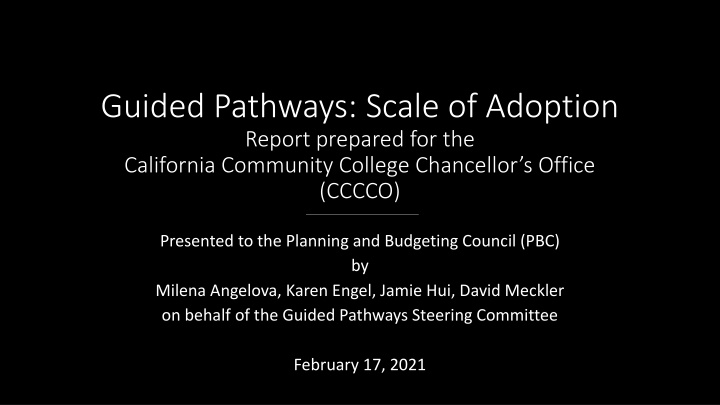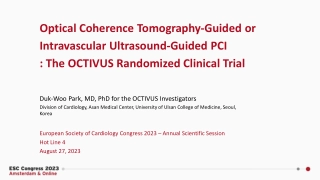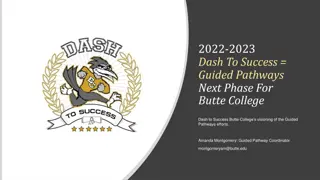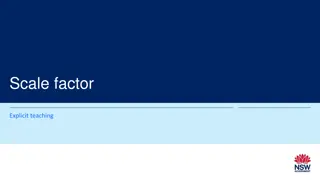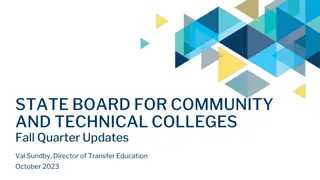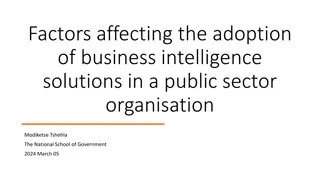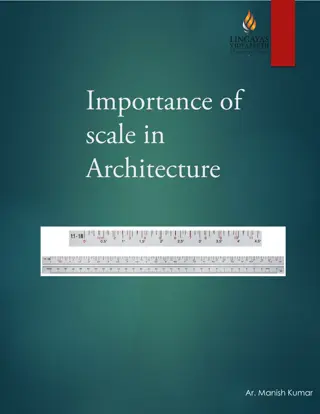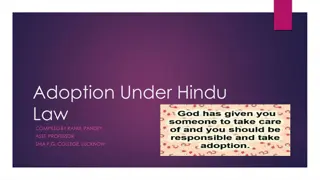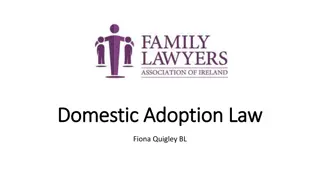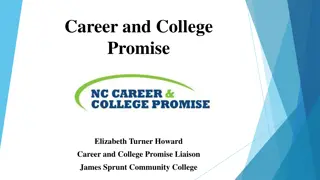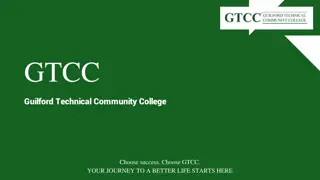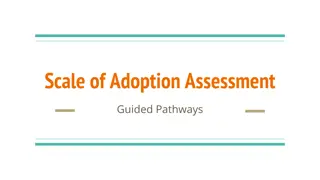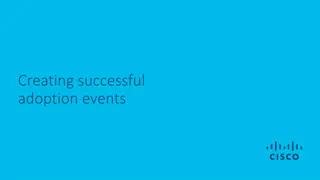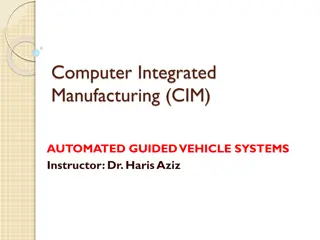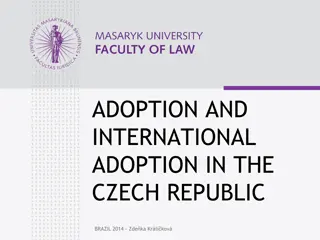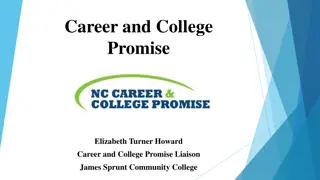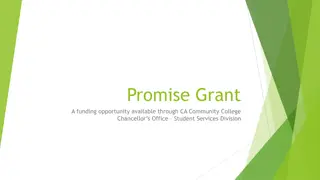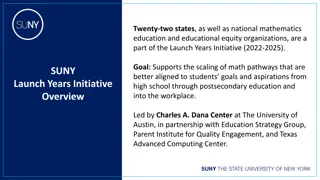Guided Pathways Scale of Adoption Report for California Community College
This report outlines the implementation of guided pathways focusing on organized program structures, student supports, engagement programs, interest area success teams, and program learning outcomes within the California Community College system. The report highlights strategies to help students navigate their academic paths efficiently and succeed in their chosen fields of study.
Download Presentation

Please find below an Image/Link to download the presentation.
The content on the website is provided AS IS for your information and personal use only. It may not be sold, licensed, or shared on other websites without obtaining consent from the author.If you encounter any issues during the download, it is possible that the publisher has removed the file from their server.
You are allowed to download the files provided on this website for personal or commercial use, subject to the condition that they are used lawfully. All files are the property of their respective owners.
The content on the website is provided AS IS for your information and personal use only. It may not be sold, licensed, or shared on other websites without obtaining consent from the author.
E N D
Presentation Transcript
Guided Pathways: Scale of Adoption Report prepared for the California Community College Chancellor s Office (CCCCO) Presented to the Planning and Budgeting Council (PBC) by Milena Angelova, Karen Engel, Jamie Hui, David Meckler on behalf of the Guided Pathways Steering Committee February 17, 2021
Programs are organized and marketed in broad career- focused academic communities Interest Areas Program Maps Every program is well designed Programs are clearly mapped out for students. Students know which courses they should take and in what sequence Program Mapper includes this Employment and further education opportunities targeted by each program are on the college website and this Students are automatically placed in SLAM and BSTEM transfer-level math courses based on their Program of Study Required math courses are appropriately aligned with the student s field of study.
Priority Engagement Program aligned with Interest Areas First-Year Experience: Colts-Con (scaling) Every new student is helped to explore career/college options, choose a program of study, and develop a full- program plan as soon as possible. Special supports are provided to help academically underprepared students to succeed in the program-relevant gateway math and English courses by the end of their first year. AB 705 Implementation Co-requisite courses Intensive support is provided to help very poorly prepared students to succeed in college-level courses as soon as possible. Embedded (EPIC) tutors (scaling) Writing Center (scaling) Special Programs (Promise, EOPS, etc. coordinating with Interest Area Success Teams (spring 2021 pilot) The college works with high schools and other feeders to motivate and prepare students to enter college-level coursework in a program of study when they enroll in college Dual enrollment (scaling)
Interest Area Success Teams: Counselors, Retention Specialists, etc (spring 2021 pilot) Advisors monitor which program every student is in and how far along the student is toward completing the program requirements. CRM/Degree Works (in design) Students can easily see how far they have come and what they need to do to complete their program. Advisors and students are alerted when students are at risk of falling off their program plans and have policies and supports in place to intervene in ways that help students get back on track. Success Teams monitor via the CRM (in design) Early Alert (scaling as part of the CRM) Course Availability clearly communicated in the Catalog The college schedules courses to ensure students can take the courses they need when they need them, can plan their lives around school from one term to the next, and can complete their programs in as short a time as possible. Schedule Optimization (scaling)
Program Learning Outcomes (to be updated) Program learning outcomes are aligned with the requirements for success in the further education and employment outcomes targeted by each program. English contextualized for STEM programs (not systematic) Course Outlines aligned to ILOs Instruction across programs (especially in program introductory courses) engages students in active and applied learning, encouraging them to think critically, solve meaningful problems, and work and communicate effectively with others. Students have ample opportunity to apply and deepen knowledge and skills through projects, internships, co- ops, clinical placements, group projects outside of class, service learning, study abroad and other experiential learning activities that program faculty intentionally embed into coursework. Career exploration courses and activities for all students across Interest Areas (under development)
All faculty assess SLOs regularly Faculty/programs assess whether students are mastering learning outcomes and building skills across each program, in both arts and sciences and career/technical programs. Programs use SLO assessments to inform program review Results of learning outcomes assessments are used to improve teaching and learning through program review, professional development, and other intentional campus efforts. Interest Area faculty leads to discuss ways to document student learning, for example Portfolium; Signature Work (needed) The college helps students document their learning for employers and universities through portfolios and other means beyond transcripts. The college assesses effectiveness of educational practice (e.g. using CCSSE or SENSE, etc.) and uses the results to create targeted professional development. PRIE conducts CCSSE/SENSE surveys need to use to create targeted professional development (needed)
Scale of Adoption: Additional Required Questions Student Engagement Course Alignment
Student Engagement In what ways are you continually engaging students in the planning and implementation of Guided Pathways on your campus? (Minimum of one required) Ca ada has actively engaged students in the planning and implementation of Guided Pathways. Beginning with our Student Voices focus groups conducted in fall 2018, followed by student engagement in the sorting of our programs into Interest Area and the creation of clearer program maps . Students helped redesign the college website and conducted UI/UX sessions to evaluate where the obstacles in the college matriculation process were to help inform the design of a new customer relationship management (CRM) tool. Finally, peer mentors are helping to inform how the college s new Interest Area aligned Success Teams can best support students.
Course Alignment How is the college exploring alignment of course offerings with student education plans? CRM and Degree Works will be communicating (Spring 2022) Program Mapper data will inform scheduling of courses (Spring 2022)
